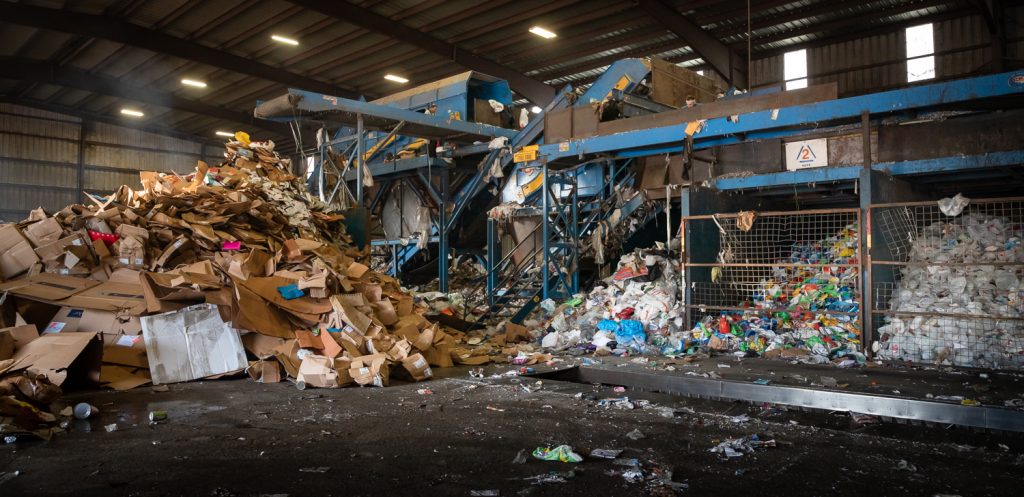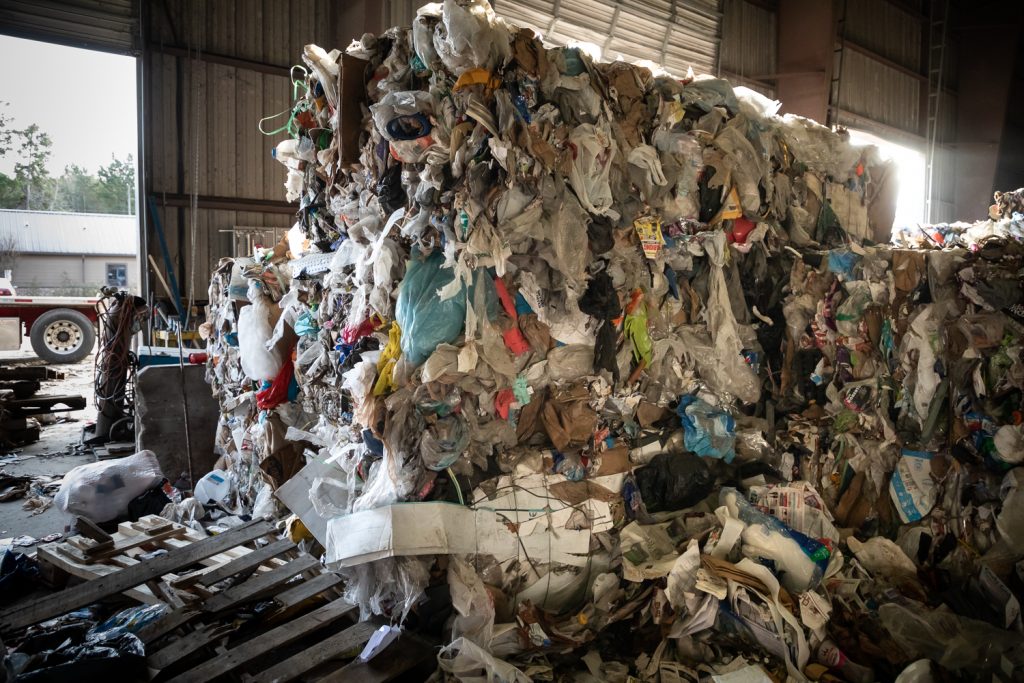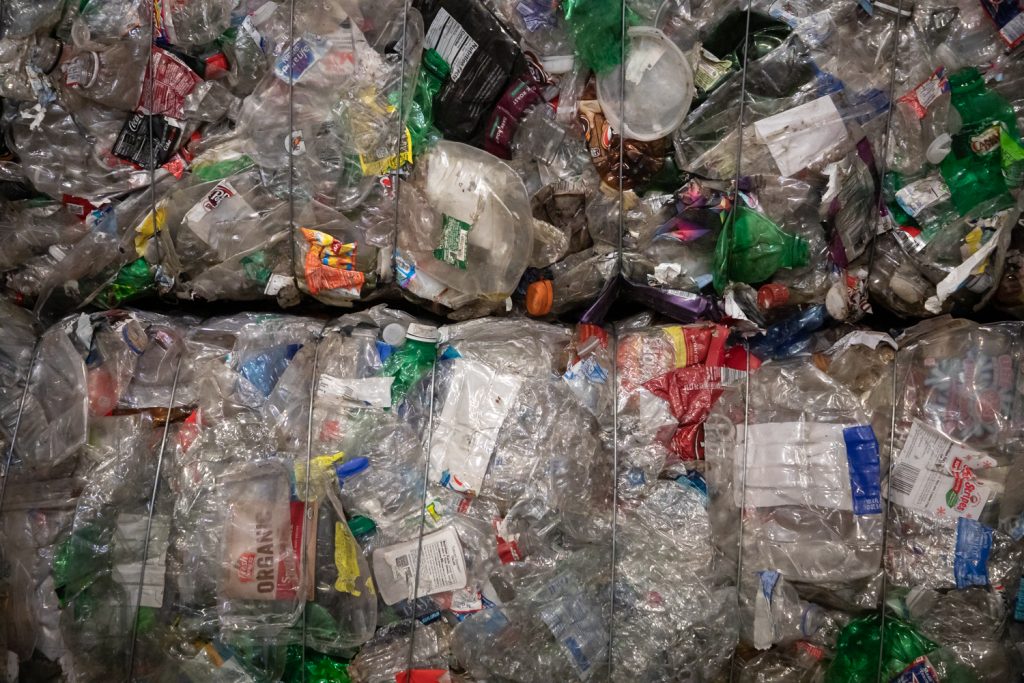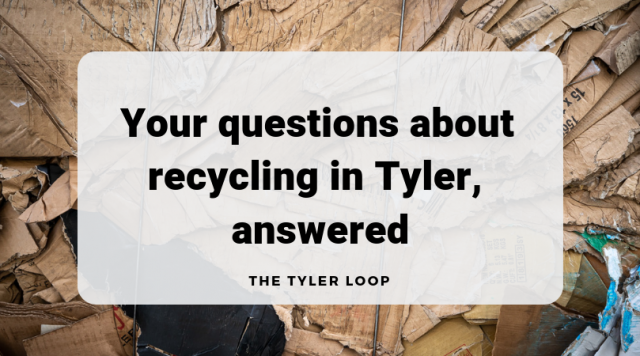Holiday cheer can mean lots of extra cardboard, paper, and other waste, and we figured it’s a good time to dig into how recycling works in Tyler. We invited Loop readers to tell us what they want to know, and nearly 70 of you sent in burning questions about how to get started, where your discarded milk jugs and holiday cards go after they leave your possession, and what it would take to expand Tyler’s recycling options.
I talked to a number of local experts and dug into regional, statewide, and national context to help you understand the recycling landscape in and around Tyler. Jump to a particular question below, or just start reading!
- What’s the cheapest, most environmentally friendly local option for keeping trash out of the landfill?
- How do I drop stuff off at the downtown Tyler Recycling Center?
- I don’t want to deal with dropping stuff off myself. How about curbside service?
- What can (and can’t) I put in my curbside recycling bin—including holiday waste?
- Why can’t we recycle more than #1 and #2 plastics?
- Can businesses, homeowner’s associations, and apartment dwellers get curbside recycling?
- Why do I have to pay for a recycling bin or dumpster?
- How has China’s decision to stop importing recycled material affected East Texas?
- Does the City of Tyler make money off its recycling programs?
- Does the stuff I recycle really get reused, or does it end up in the landfill?
- Tyler’s current recycling options aren’t enough. I want weekly pickup, leaf pickup, more Recycling Centers, and free curbside service. Why doesn’t Tyler offer these things—and how can I make my voice heard?
- Sources for this story
What’s the cheapest, most environmentally friendly way in Tyler to keep trash out of the landfill?
No surprise here: several of the local experts I talked to say it’s crucial to reduce the amount of trash you generate in the first place. Texas recycled just 22 percent of its trash in 2015—the most recent figure available—compared to a national recycling rate of about 34 percent. “The best thing for the environment is to put more consumer emphasis on reducing waste and reusing materials,” says Russ Jackson, director of Tyler’s Parks and Recreation Department. Recycling is a really important part of the puzzle, says Jackson, “but you do have to think about the carbon footprint involved with shipping recyclable materials across the ocean to buyers like China.” Reusable water bottles and shopping totes are relatively cheap and easy ways to reduce your personal trash output.
As for the stuff you can’t avoid throwing out, the City of Tyler offers two recycling programs to keep some of it out of the landfill. There’s curbside recycling, which involves a city truck coming to your home, apartment building, or business and picking up recyclables from a bin you leave out on the curb or from a larger dumpster. The city also offers the Tyler Recycling Center, a downtown drop-off site where anyone can dump common recyclables for free, and bulky or specialized items for a fee.
Jackson hopes that if you’re just getting started with recycling in Tyler, you’ll try using the Recycle Center first. “I prefer this option as being more eco-friendly, with a smaller carbon footprint,” he says, pointing out the significant fuel resources needed to send a 30-ton recycling truck to individual homes across the city.
How do I drop stuff off at Tyler’s downtown Recycle Center?
The Recycle Center is located at 414 North Bois D’ Arc Avenue, open weekdays from 7:15am to 5:30pm and on Saturdays from 8am to 2pm. Pull into an empty space in front of the Center and carry your items to the various clearly marked dumpsters.
You don’t have to live in Tyler to use the Recycling Center; it’s open to everyone.
You have to sort your waste items before dropping them off. Try keeping separate bins for glass, paper, cans, and plastics in your home, and haul your bins to the Recycling Center when they’re full.
Here’s the list of what you can recycle at the Center. Unless otherwise indicated, it’s free to drop these items off:
- Newspapers, magazines, phonebooks, and junk mail
- Cardboard of any type (boxes must be broken down)
- Aluminum cans (no aluminum pie plates, baking tins, or tin foil), tin cans (labels removed)
- Mixed office paper
- #1 and #2 plastic soda and water bottles, milk jugs, and detergent bottles (rinsed)
- Cell phones and chargers
- Electronics, computers, printers (there is a charge for computer monitors)
- Ink and toner cartridges
- Clear, green, and brown glass bottles and jars (must be rinsed with lids removed—no mirrors)
- Automotive, lawnmower, and tractor batteries
- Metal (copper, aluminum, brass, steel)
- Motor oil/hydraulic fluid, anti-freeze
- Household appliances (see website for fees associated with some appliances)
- Some furniture (see website for fees)
The Center’s employees bale up the material you drop off and transport it to buyers like Evergreen Paper Recycling or Strategic Materials, both in Dallas, or Rivers Recycling in Kilgore. There, the materials are either resold as is to manufacturers or other buyers, or processed into new materials and then sold.

I don’t want to deal with dropping stuff off myself. How about curbside service?
If you’re responsible for your own trash collection in Tyler and you want someone to pick up your recyclables for you, check out the City of Tyler’s curbside recycling program.
The city provides you with a rolling bin, similar to your regular trash bin, and you fill it up with a mix of certain recyclable items (more on what goes in the bin below). One of the benefits of this method is that you don’t have keep things separated.
Curbside pickup costs $5.25 a month, which the city tacks onto your water bill. To get a bin, call Solid Waste at 903-531-1388 or email [email protected]. Solid Waste will drop your bin off at your home within about a week.
Every two weeks, you put the bin out on the curb by 7am, alongside your regular trash bin. The city will let you know which day your neighborhood’s pickup occurs when you sign up; you can also download the “Tyler Talks Trash” app on your smartphone to see your date and get reminders. If you find your bin ends up overflowing before pickup day, you can order a second bin for an additional $2 a month from Solid Waste.
Your waste gets hauled away to Rivers Recycling in Kilgore, the sorting facility that processes curbside recycling for several East Texas cities. Rivers is the only such facility between Dallas and Shreveport; it’s basically the recycling hub of East Texas. There, it’s sorted, baled, and ultimately sold to manufacturers who reuse your material.
What can (and can’t) I put in my curbside recycling bin—including holiday waste?

Here’s what you can put in the can:
- Plastics labeled #1 through #7 (more on this below). No plastic lids though—unless marked recyclable, lids go in the trash
- Paper items: newspaper, magazines, cards, books, etc.
- Cardboard: toilet paper rolls, packaging, etc.
- Steel and aluminum cans: don’t bother taking off the labels
Skip the trash bag—and most plastic shopping bags! Unfortunately, most shopping bags and trash bags aren’t recyclable through Tyler’s curbside recycling program. Justin Skinner, general manager of Rivers Recycling Kilgore, which sorts and bales the contents of Tyler’s curbside bins, says trash bags cause a lot of problems with his equipment. He recommends keeping a large unlined trash can in your home for recyclables and periodically dumping the contents into your outdoor curbside bin as your indoor can gets full. Some retailers offer plastic bags that are marked with a #2, indicating that they are recyclable through Rivers’s curbside recycling intake, but most don’t.
The good news is you can take your unmarked plastic shopping bags to several retailers across town, including Fresh, Target, Wal-Mart, and Brookshire’s locations, where they can be reused; look for a plastic bag recycling container near the entrance. You can look for additional local plastic bag recyclers here.

To rinse, or not to rinse? You’ll be happy to hear that, according to Skinner, you don’t have to bother with rinsing milk jugs and cans. Scrape large food debris off, of course, but Skinner says Rivers has invested in equipment that can handle items in less than pristine condition. Skinner says you can also skip the step of crushing jugs and cans, or breaking down cardboard boxes. “If you want people to recycle, you have to make it easy for them,” he says. “We invest in equipment on our end so that you don’t have to think about it.”
Hold on to your glass. Rivers Recycling doesn’t accept glass, so don’t put glass of any kind in your curbside recycling bin. Skinner explains that the equipment needed to sort and process glass is prohibitively expensive, and it’s too dangerous for the plant’s employees to manually sort material that contains glass. You can, however, pile up your glass in a separate indoor bin and take it to the City of Tyler’s downtown Recycle Center.
Common items that don’t belong in your curbside bin:
- Styrofoam
- Batteries
- Used clothes
- Plastic utensils
- Batteries
- Glass of all kinds (see above)
- Plastic grocery bags (see above)
During the holidays, be aware that you can’t recycle Christmas lights or trees through your curbside bin. Plain wrapping paper, greeting cards, and gift bags are fine, but those with glitter, foil, or other bling will end up in the landfill. Plastic that is marked #1 or #2 will find a buyer; plastics marked #3 through #7, or not marked at all, probably won’t for the time being.

Why can’t we recycle more than #1 and #2 plastics?
This one’s a bit tricky. If you’re a curbside recycling customer in any of the cities that Rivers Recycling works with—including Tyler, Longview, and Kilgore—you can in fact put plastics marked #1 through #7 in your bin. But you need to understand that right now, Rivers isn’t able to find a steady buyer for plastics marked #3 through #7.
“What we’re able to sell is dictated by the market,” explains Rivers’s general manager Skinner. When Rivers first opened in 2011, they had steady buyers for all recyclable plastics, but the market for #3 through #7 dried up about four years ago. But that could change again. “We expect that in the future, there will be a market for [more varieties of plastic] again,” says Skinner.
So what does that mean for your recyclables right now? #1 and #2 plastic will definitely be sold and recycled, Skinner says, but at the moment, the #3 through #7 plastics you send to Rivers in your curbside bin will end up in the landfill.
But Rivers doesn’t want people to become discouraged from recycling by making it more complicated, or dissuade people from sending in #3 to #7 plastic given that the market might open up again the future. That’s why Rivers says on its website that it accepts plastics #1 through #7, even though it can only recycle #1 and #2 right now.
It’s up to you, as an individual consumer, to decide whether to send these plastics to Rivers currently, or send them to the landfill yourself.

Can businesses, homeowner’s associations, and apartment dwellers get curbside recycling?
If you rent and are responsible for setting up your own trash collection, you can simply order a curbside recycling bin from Solid Waste.
If you live in an apartment complex, homeowner’s association, or dwelling where trash is taken care of by someone else, you can try to convince your HOA or building management to get a recycling dumpster from the City of Tyler, or from a private company like Republic Services, a waste disposal company in East Texas that offers commercial recycling in Tyler and residential recycling outside Tyler. Republic works with several homeowner’s associations in our region. Call Republic and ask for general manager James Murphy if you’re interested in learning more.
What about businesses and churches? Small businesses and churches can order a regular curbside bin from Solid Waste. For larger businesses, the City of Tyler offers recycling dumpsters from about $70 to $100 a month for commercial recycling. Currently, the city has only about 100 commercial curbside customers. Businesses and churches can also shop around and get quotes from private companies like Republic Services.
Why do I have to pay a monthly fee for curbside recycling? I’m doing something good for the environment!
This question came up a lot, and all of the experts I talked to for this story have heard it many times before. “It would be good for the public to understand that there are a lot of costs associated with recycling,” says Murphy, general manager of Republic Services. “People think we’re making all kinds of money on the backend, and that’s not the case.”
Whether it’s a private company like Republic or a municipality like the City of Tyler, anyone offering curbside recycling has to pay for the trucks, drivers, and transportation costs of getting material from people’s homes to a facility like Rivers Recycling, where it’s sorted and baled either by manual labor or expensive equipment. What’s more, as of this year, thanks to changes in the global recycling market, Rivers Recycling is far less profitable than it has been in recent years. As a result, the company now charges a “tipping fee” of $20 a ton to drop recyclable materials off at its Kilgore facility.
Leroy Sparrow, general manager of the city’s Solid Waste Management department, says one alternative to charging individuals who request a curbside bin would be to increase everyone’s monthly trash collection fee across the board, whether they recycle or not. Sparrow says there hasn’t been much discussion of that option among city officials. Overall, Sparrow says he asks the public to understand that “the revenue to pay for these programs has to come from somewhere, whether you’re paying for it through your regular trash collection or through a separate recycling charge.”
Russ Watson, former director of Solid Waste and current director of Parks and Rec for the City of Tyler, says residents who don’t want to pay a monthly fee for curbside recycling can utilize the city’s downtown Recycling Center for free.
Does the City of Tyler makes money off of its recycling programs?
The downtown Recycling Center costs about $100,000 a year to run, according to revenue figures shared by the Solid Waste department. It made a small profit the last four years, but this year, thanks largely to China’s recent decision to stop importing recycled materials from other countries (more on that below), it ran at a loss of about $10,000. Solid Waste manager Sparrow says “things have started to stabilize and we hope to break even again.”
The city’s curbside recycling program costs about $245,000 a year, and it has never been profitable. In fact, for the last four years, it ran an average annual loss of about $100,000. But the city more than doubled the monthly fee to residents for curbside recycling this year, largely in response to China’s waste import ban. This year, the city’s net loss from this program is expected to be down to around $15,000.
The higher monthly curbside fee didn’t result in a huge drop-off in customers. Last year, 4,111 people in Tyler had a curbside recycling bin, and this year, there have been 4,048 participants in the program.
How has China’s decision to stop importing recycled material affected East Texas?
For decades, China was by far the biggest buyer of the world’s discarded paper and plastic waste. But last year, the country totally changed the global recycling game by deciding to stop importing “foreign waste” and rely on its own resources instead. Chinese officials said the reversal is a step toward reducing the country’s infamous pollution problems. As a result, some U.S. cities have stopped offering recycling programs altogether as unpurchased waste piles up, and others have cut down on the types of material they accept.
Here in East Texas, Rivers Recycling, the sorting facility that processes curbside recycling from several local cities, used to pay suppliers like the City of Tyler for material, which Rivers was then easily able to sort, bale up, and sell at a profit to brokers operating on the global market. But this year, in the face of drastically reduced revenues thanks to the Chinese import ban, Rivers actually starting charging Tyler and other suppliers $20 a ton to take trash off their hands. That’s one way the shrunken global market for recyclables is making itself felt in East Texas.
City of Tyler officials say this year’s increase in curbside recycling fees means they don’t anticipate having to suspend or cut back recycling programs.
Does the stuff I recycle actually end up getting reused, or does it just end up in the landfill?
There are a lot of conflicting statistics and claims out there about how much recycled material actually gets recycled.
As I’ve noted above, Rivers Recycling in Kilgore is the only recycling sorting facility between Dallas and Shreveport. Rivers takes the contents of curbside bins from Tyler, Kilgore, and Longview, as well as everything that Republic Services, a private waste collection company, brings them. In all, Rivers processes over 2,500 tons of material each month.
Rivers Recycling general manager Skinner says that as long as there is a market for the items you’re putting in your curbside bin, they will get recycled. He says Rivers works hard to find buyers for every possible item that comes through its doors. “The main grades of material that we deal with out of here”—meaning paper, cardboard, and certain plastics—”we’ve never not had a buyer for.” Each month, Rivers sales employees call around to various buyers it’s worked with in the past, or gets contacted by additional brokers, and shops around for the highest bids on the material the plant has stockpiled. Typical buyers include Pratt Industries, a packaging recycler in Shreveport, Georgia Pacific, the Atlanta-based pulp and paper company, and Midland Davis, a metal scrap recycler.
The Chinese recycling import ban has drastically driven prices down, but Rivers is still selling those items. “We don’t make money off of sending things to the landfill,” says Skinner. “In fact, it costs us to transport material to the landfill. So even if we’re only going to make five or six cents a pound, it’s in our best interest to sell everything we can possibly sell.”
Rivers does send a whole lot of stuff to the landfill each month, but that’s mostly stuff that should never have been put in recycling to begin with. Right now, they’re dealing with huge amounts of Christmas decor—lights, artificial trees—that was always destined for the landfill. “People think it’s plastic, so it must be recyclable, but that’s not always the case,” says Skinner. Currently, Rivers also send plastics marked #3 through #7 to landfill, although it hopes new buyers will emerge soon for those products.
Messy or soiled items are less of a problem than you might think, says Skinner. “Our equipment is able to handle most of what comes in, as long as we have a buyer for it.”
As for what ultimately happens to your paper, plastics, cans, and so on, here’s a nice interactive graphic that shows what happens to many common recycled items.

The current options for recycling aren’t enough. I want weekly pickup, leaf pickup, more Recycling Centers, and free curbside service. Why doesn’t Tyler offer these things—and how can I make my voice heard?
I asked about the viability of the many expanded options Loop readers are interested in. Right now, the City of Tyler doesn’t plan to offer additional recycling drop-off sites, new kinds of recycling (including leaf pickup—a popular Loop reader request), or more frequent curbside pickups. According to Solid Waste manager Sparrow, it’s a matter of funding. “The more we run the truck, the more it’s a cost,” he says. “More recycling centers would mean more employees. New kinds of pickup would require new kinds of vehicles.”
Julie Goodgame, director of marketing and communications for the city, urges citizens who want the city to put more revenue into recycling programs to get involved. “You can email your city council representative or the city manager at any time, and I can tell you that every message does get read and that we frequently discuss the communication that comes to us from the public,” says Goodgame.
Goodgame also recommends engaging with the annual budget process, which begins each August with hearings and opportunities for public comment on what the city should fund in the coming year. “The budget is the blueprint for how we operate, and it’s a really good time to come in and weigh in,” says Goodgame.
Goodgame adds that there can be strength in numbers—including demonstrating a market for additional services by utilizing existing ones—and the more homework you can do to educate yourself on the budget process beforehand and even be able to make recommendations as to potential funding sources, the more effective your public comment is likely to be.
Sources for this story
The Tyler Loop is committed to transparency and making it easier for people to find answers to their own questions about our community. Here’s a list of sources that I spoke to for this story, alongside additional research and data gathering:
- Justin Skinner, general manager, Rivers Recycling in Kilgore
- Angela Bennis, Keep Tyler Beautiful community coordinator, City of Tyler
- Leroy Sparrow, Solid Waste manager, City of Tyler
- James Murphy, general manager, Republic Services East Texas
- Russ Jackson, Parks and Recreation director, City of Tyler
- Julie Goodgame, director of Marketing and Communications, City of Tyler
Thanks for reading this story. Just one more thing. If you believe in the power of local journalism here in Tyler, I'm hoping that you'll help us take The Loop to the next level.
Our readers have told us what they want to better understand about this place we all call home, from Tyler's north-south divide to our city's changing demographics. Power, leadership, and who gets a seat at the table. How Tyler is growing and changing, and how we can all help it improve. Local arts, culture, entertainment, and food.
We can't do this alone. If you believe in a more informed, more connected, more engaged Tyler, help us tell the stories that need to be told in our community. Get free access to select Loop events, behind-the-scenes updates about the impact and goals of our work, and, above all, a chance to play a part in bringing more fresh, in-depth, unexpected journalism to Tyler.








